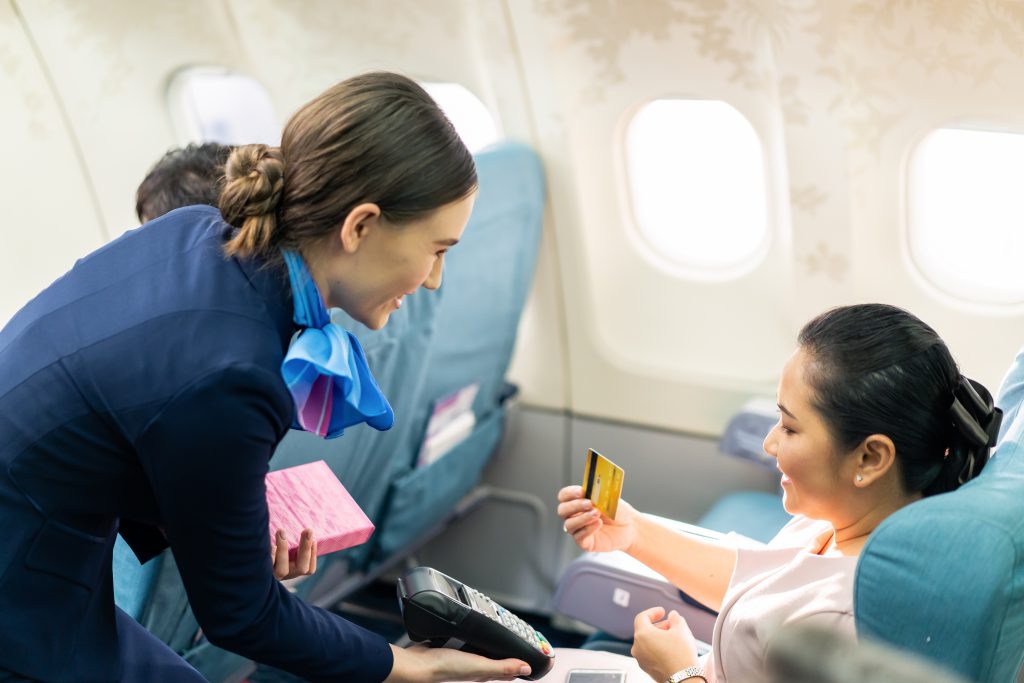


Digital in-flight concessions or Inflight Digital Stores continue to grow in relevance as a revenue stream and a key component of passenger experience, driven by advancements in IFEC (In-Flight Entertainment and Connectivity) platforms. These digital stores enable passengers to shop during their flight and have products delivered post-flight. However, addressing the Merchant of Record (MoR) issue remains pivotal to unlocking the full potential of these services.
1 – Increasing Adoption Across Airlines
Airlines are progressively integrating digital marketplaces, often linked with loyalty programs, allowing passengers to use frequent flyer miles or co-branded credit cards for purchases. Emirates, Delta, and Singapore Airlines are among those enhancing their digital shopping ecosystems.
2 – Rise of AI-Driven Personalization
Artificial intelligence now plays a key role in offering passengers tailored product recommendations, increasing conversions, and improving satisfaction. Passengers increasingly expect their digital in-flight shopping experience to mirror the personalized convenience of e-commerce giants like Amazon.
3 – Enhanced Payment Infrastructure
Advances in real-time payment processing and secure tokenization methods have made digital payments more reliable and secure. Global payment providers are adapting their solutions for in-flight environments with limited connectivity.
The Merchant of Record (MoR) is the entity responsible for managing the entire payment process, including:
– Transaction Processing: Ensures all payments are valid and legal.
– Compliance: Manages tax obligations, PCI DSS compliance, and regional regulations.
– Liabilities: Assumes responsibility for refunds, chargebacks, and disputes.
For in-flight digital stores, the MoR bridges passengers, airlines, and third-party brands, acting as the central point for all financial and regulatory interactions.
Fragmentation of Responsibility
Airlines often partner with multiple vendors, making it unclear whether the airline, the brand, or a third-party payment provider should serve as the MoR. This fragmentation leads to inefficiencies and regulatory complications.
Data Ownership and Security
Airlines prefer to keep customer data on their own servers to safeguard privacy and ensure compliance with regional data protection laws like GDPR. Sharing data with third-party MoRs raises concerns over potential breaches.
Complex Tax Regulations
Cross-border sales complicate tax collection. Airlines need to determine VAT, GST, and other taxes based on the passenger’s departure and destination countries.
Limited Connectivity
In-flight transactions often occur in offline environments, requiring synchronization with payment gateways post-flight. This introduces a risk of declined payments or unresolved disputes.
Insights from Forthcode
During an interview with our partner, Forthcode, they highlighted key strategies to address MoR challenges:
1- Regulatory Compliance and Payment Terminal Integration: Forthcode partners with best-in-class payment infrastructure providers specializing in in-flight and offline payments. Their expertise enables airlines to accelerate integration processes while ensuring compliance with geography-specific regulations.
2- Fraud Prevention and Payment Reconciliation: Offline payment fraud detection remains a significant concern for airlines. Forthcode’s proprietary algorithms reduce fraud by over 50%. Additionally, their advanced card payment reconciliation modules provide complete traceability for every transaction.
3- Ancillary Maximization: Forthcode’s products, such as Lounge in the Sky™, transform inflight retail into a profit center by optimizing ancillary revenue opportunities.
1- Standardization Initiatives
Organizations like IATA are working toward standardizing MoR practices for digital in-flight digital stores, reducing the regulatory burden for airlines.
2- Integrated Loyalty Programs
Airlines increasingly link concessions with loyalty programs, allowing passengers to redeem miles and points for purchases, further boosting engagement and revenue.
3- Onboard 5G Connectivity
Enhanced in-flight connectivity, particularly with the rollout of 5G-based air-to-ground systems, will reduce the challenges associated with real-time payment processing.
4- Future Innovations by Forthcode:
– The growing use of low-bandwidth satcom for online payments by low-cost carriers (LCCs).
– In-flight payment experiences driven by BYOD/IFE portals.
– Projected 20-25% CAGR in inflight revenue over the next five years.
5- Sustainability Focus
Airlines are also leveraging digital concessions to offer carbon-offset products, appealing to environmentally conscious travelers.
The MoR issue remains central to the evolution of digital in-flight concessions, but 2024 marks a year of significant progress. By adopting innovative technologies and fostering strategic collaborations, airlines can overcome these challenges and unlock the full potential of their digital marketplaces. The result is a win-win: enhanced passenger satisfaction and increased ancillary revenue streams.
With trusted partners like Forthcode addressing key challenges and driving innovation, the future of in-flight digital stores looks promising.
TRAVELER’S MICRO-MOMENTS Home Capturing the Traveler's Micro-Moments 26 April 2022 microMoments, Technology, traveler Time Is No Longer Measured in Days,…
IFE TO THE RESCUE Home WHEN IFE COMES TO THE RESCUE OF FLIGHT ATTENDANTS! 25 June 2022 Digital Services, IFE,…
Digital AD: IVT-FREE Zone Home DIGITAL INFLIGHT ADVERTISING: AN IVT-FREE ZONE 20 May 2022 Advertising, IVTFREE, Technology In late 2015,…